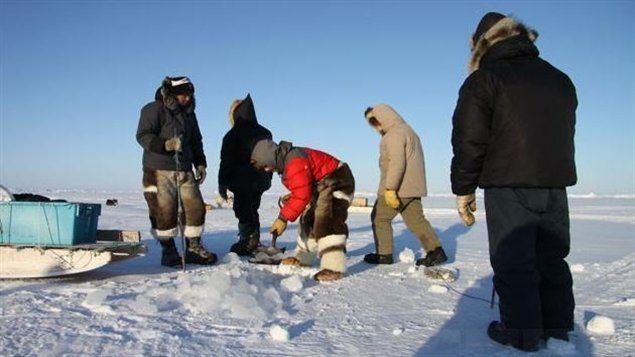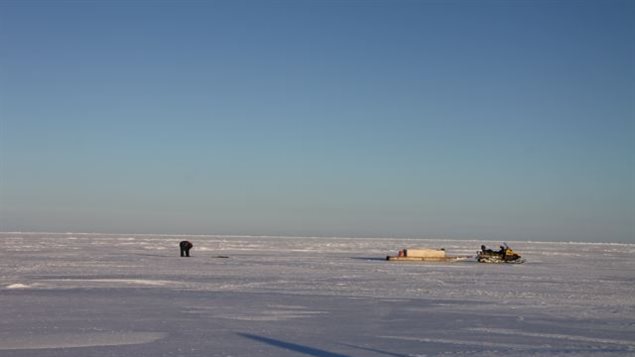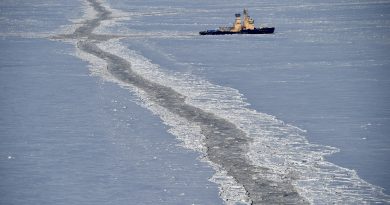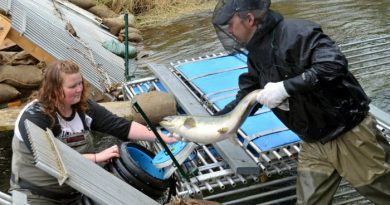Arctic festival to draw attention to food insecurity, climate change

A tiny northern community is throwing a party to try to draw national and international attention to the effects of climate change on food security for the Inuit people in the Canadian Arctic.
The Nunavut community of Igloolik is hosting a festival called Kiss the Earth to raise awareness and funds for vulnerable people facing hunger because of food insecurity caused by climate change.
The four-day event will feature a tundra clean up, musical performances by stars such as Kelly Fraser and the first “Green carpet” screening of Theo and Chloe, starring Igloolik elder Theo Ikummaq, Dakota Johnson and Mira Sorvino, and produced by Sir Richard Branson, said Dana Barker-Sheaves, one of the main organizers and an assistant manager at Igloolik Coop, an Inuit-run coop.
The rest of the world simply might not know how much global warming and climate change affect small, fly-in, remote communities like Igloolik, she said.
(click to listen to the interview with Dana Barker-Sheaves)
“We see food insecurity a lot in the Canadian Arctic,” Barker-Sheaves said speaking on the phone from Igloolik. “We see people who just don’t have enough to be able to provide for their families.”
Traditional hunting and fishing were always a big part of Inuit culture in the Canadian Arctic and with the ever-changing sea ice, and the melting of the sea ice that’s becoming a lot harder, depriving people of traditional sources of healthy and nutritious food, she said
Even with -40 degrees in Igloolik on Thursday, the floe-edge, the mass of sea ice that’s supposed to be the prime hunting ground, is a lot smaller this year, making hunting a lot more difficult, said Barker-Sheaves.
“Every day we see less and less what we call ‘country food’ available to our people,” Barker-Sheaves said. “And because we’re so remote, getting regular food here comes at a cost.”
The coop no longer can secure the caribou or seal meat as easily as it used to years ago, said Barker-Sheaves.
“The climate change is what causing people to be hungry,” Barker-Sheaves said. “It’s not the cost of bringing food to our community, it’s the climate change. We no longer provide what we always did because of melting sea ice.”
Graham Dickson, CEO Arctic Kingdom, an Iqaluit-based company that specializes in Arctic safaris, eco-expeditions and diving, and is one of the corporate sponsors of the event, said he has seen the effect of climate change first hand in the 17 years he’s been bringing tourists to the Arctic.
(click to listen to the interview with Graham Dickson)
“Igloolik is a special place with huge expanses, it’s a little bit like the prairies if you will,” said Dickson. “There is lots of sea ice moving around the Fox Basin, and it’s special because there are bowhead whales, there are huge groups of walrus, and it’s one of the highest areas of polar bear concentration in the world.”
But climate change is disrupting this fragile ecosystem and the way of life that has developed around it, Dickson said.

Sometimes there is too much ice and some years not enough, making it difficult for Inuit hunters to access their traditional hunting and fishing areas or to guide groups of tourists to areas where they can experience the majestic fauna first-hand, Dickson said.
“We want the world to know that global warming is having an impact,” said Barker-Sheaves. “We may not see it down south the way we see it in the Arctic but every year the conditions are changing: the ice is changing, the wildlife and country food is changing… Eventually, it’s going to move past just the Arctic.”
Related stories from around the North:
Canada: Addressing northern food insecurity, Blog by Heather Exner-Pirot
Norway: The food crisis in the Far North, Barrents Observer
Sweden: Demand ups Sweden’s reindeer meat prices, Radio Sweden
United States: Food insecurity in Alaska, Alaska Dispatch News



